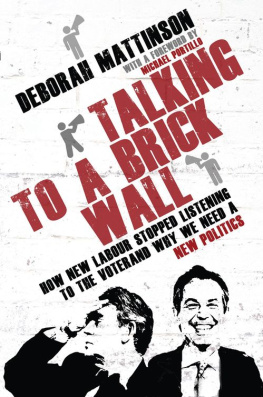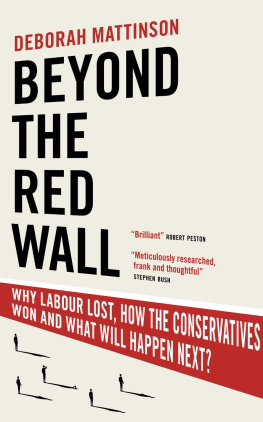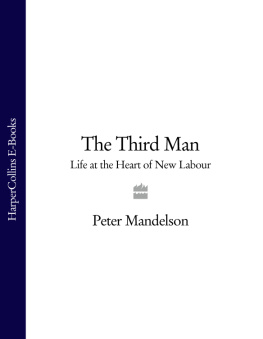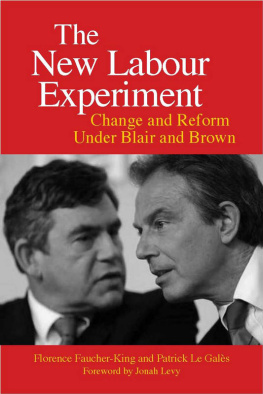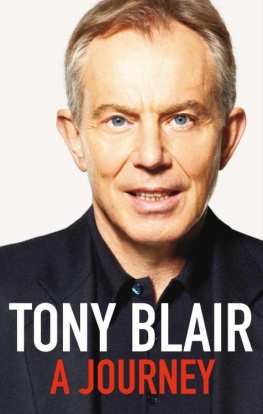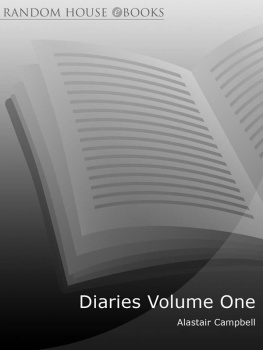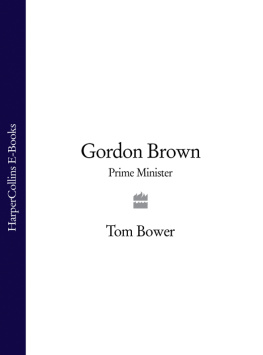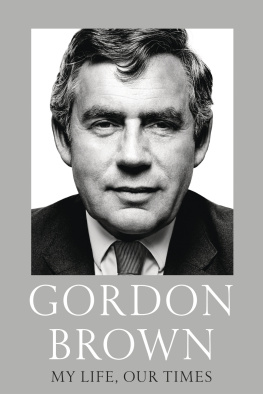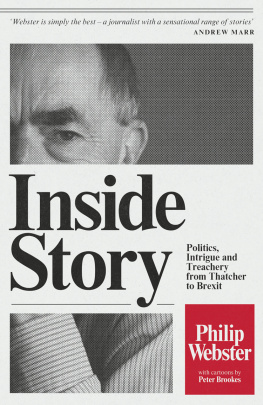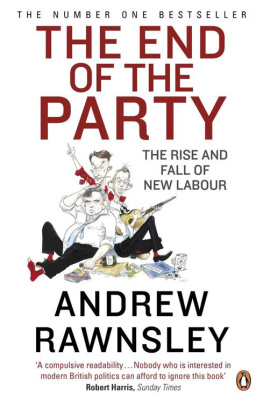This book was written in a few weeks but draws on the work of twenty-five years and more. I owe thanks to so many people
To my father, Dick Mattinson, for nurturing my interest in, and enthusiasm for, politics, and to my mother, Jo, and brother, Robert, for putting up with our often heated debates.
To the many colleagues who have worked with me on Labour Party projects over the years: at Ayer Barker back in the beginning, then at Gould Mattinson Associates, at Opinion Leader Research after 1992, and finally at Brand Democracy. Many of you have been involved in this book directly and all of you have helped me along the way. Special thanks are due to Natalie Read, Mark Bunting, Graeme Trayner, James Morris, Ben Shimshon and Des Bezuidenhout.
To Viki Cooke, my long-standing and long-suffering business partner, whose wise counsel made the work better and good humour made it fun.
To everyone who contributed to the Shadow Communications Agency polling and focus group programme: Leslie Butterfield, Jane Bigham, Tim Mills, Kay Scorah, Peter Kellner, Nick Moon and especially Roddy Glen, who played such a vital role, and who allowed me to read his amazing notes from all that time ago.
To my sister in law, Kiki McFarlane, and friend Sarah Webb who listened while I ran through early thoughts on the book and brainstormed the Peter Pan politics idea with me.
To many friends who generously gave their time and advice, including Fiona Reynolds, Laura Vincent, Patricia Hewitt, Spencer Livermore and Roger Williams.
To Iain Dale, James Stephens, Jonathan Wadman and Sam Carter at Biteback, and Caroline Michel and Nelle Andrew at PFD, who have all been terrific to work with.
To Dan Hancox, who provided background research and helped organise and manage the Harlow panel, and to Sue Matthias, whose clear-sighted, creative, advice and superb editing skills were completely invaluable.
To all the Harlow panel, whose insights were brilliant, and to everyone who has ever been in one of my focus groups I have tried my best to convey what you have told me to people who have the power to make a difference.
To all the politicians that I have worked with, over the years, many of whom have become good friends. I hope you think this book is fair even though its message is sometimes not what you would want to hear.
To my kids I have noticed that people often apologise to their offspring for their absence when writing I apologise instead for my annoying presence. Clara was able to escape on her gap year travels only after carefully transcribing many hours of focus group tapes for me, for which I am grateful. Theo and Francis, working for A-levels and GCSEs, had to put up with my hovering around when the solitary task of writing got too much which was quite often.
And most of all to Dave, who tolerated my descent into ber-sluttishness as the piles of paper grew and grew around my desk and absolutely nothing else got done. Thank you so much for your constant support and for just making everything possible.
When I first stood for Parliament, a lady in Handsworth in Birmingham asked me a difficult question. She was by then the only white face in her street, and she wanted to know when she had had the opportunity to vote for or against a multiracial society. The incident drifted back into my mind when, during the last election, Gordon Brown described Gillian Duffy as a bigot, after she raised the question of immigration. Many voters feel that the biggest political issues are never presented to them, and that raising delicate questions with politicians capital punishment or leaving the European Union would be other examples will simply get them labelled, as Mrs Duffy was, and dismissed.
National politics sits unhappily between the local and the global. It is hard for parliamentarians to convince the voter that they can really accomplish anything against forces that sweep the planet: recession, climate change, terrorism or pandemics. Yet they are equally unconvincing about how their national policies can make a difference in the local school or A&E. To make matters worse, local politicians have been stripped of most of their powers. They receive most of what they spend from central government, and abide by its diktats.
It is not hard to understand why people feel disillusioned. The three main parties crowd together on the centre ground, so most voters find it hard at election time to know what choice they are being offered. They rely on habit, or they deduce from the parties histories where their real instincts lie, or they vote for a change of government when they have grown tired of the incumbents.
In the last election, the three parties avoided debating the true nature of the deficit. But as soon as the coalition took office it made clear that austerity lay ahead. Voters may ask why that could not have been clearly explained before the votes were cast. The distrust is mutual. Politicians would respond that they could not tell the electorate the truth because it clearly did not understand the gravity of the economic situation. Voters found it hard to believe that the nation could be in a mess if they personally felt perfectly solvent.
Deborah Mattinson examines in this book how the gulf between voters and MPs has grown. She traces how New Labour sought to track public sentiment through focus groups and to listen to those voices, but how, over time, it ceased to listen. But she also points out that voters infantilise themselves. Too many believe that politics is what politicians do, and that democracy is only about voting. In fact, politics and democracy should involve everyone in the country. If the present set of MPs is venal and self-seeking, let a new wave of volunteers step forward. Even those who would not wish to stand for election should reflect that it has always been possible for people outside Parliament to start movements and to set the agenda, and that is especially possible in the age of the internet.
My own view of the New Labour experience is not that it listened too little, but that it led too little, especially at the beginning. Voters have plenty to say, of course, but they do not wish to take the time to understand every issue They cast their votes in the hope that their government will lead. Sometimes they will hate it for where it takes them. Many grew to dislike Margaret Thatcher and then, after the Iraq War, Tony Blair. But at least voters understood their characters. They gave them credit for not being insipid.
This book comes at an interesting moment in British political history. Politicians from two different parties have set their disputes aside in order to govern together: the sort of action that many voters have apparently been clamouring for. It seems that the country is to be led firmly albeit into the valley of austerity. Citizens will be asked to shoulder more responsibility and play a bigger role in shaping the places where they live. In the pages that follow, you will often read that voters demand to be told the truth. The period ahead may test whether they can handle it; or it may prove that voters are more grown-up than politicians have assumed.
Michael Portillo
June 2010
My first experience of a political focus group was in a small terraced house in Balham, south London in 1985. I had been invited along by Colin, a research and polling professional and prominent member of the Breakfast Group a collection of experts advising Labour. We arrived early and arranged the room, dragging the sofa, armchairs and dining chairs in the sitting room/diner into a semi circle. Colin perched on a chair in front of the fireplace as the eight voters male, lapsed Labour arrived. I sat at the back with tape recorder and notepad.

